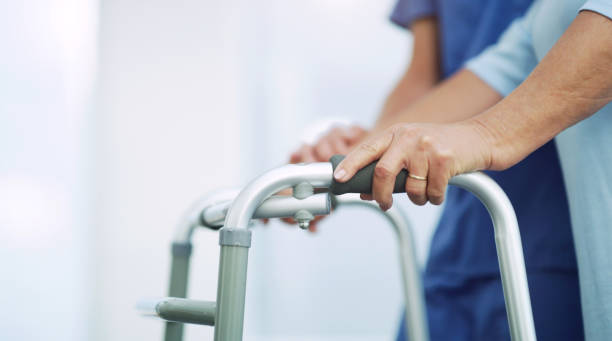As individuals age, mobility issues often become a significant concern, impacting their ability to live independently and maintain a high quality of life. For seniors, limited mobility can lead to challenges in performing daily activities, increasing the risk of falls, isolation, and a decline in overall health. However, with the rise of home healthcare services, seniors now have access to personalized care that enables them to navigate mobility challenges while staying in the comfort of their own homes.
Home healthcare offers a range of services, from physical therapy and rehabilitation to personal care assistance, designed to support seniors with mobility limitations. By providing tailored care and assistance, home healthcare plays a crucial role in helping older adults maintain their independence and dignity as they age.
Contents
Understanding Mobility Challenges in Seniors
Mobility challenges among seniors can stem from a variety of causes, including arthritis, muscle weakness, joint pain, or chronic conditions like Parkinson’s disease and stroke. These conditions often make it difficult for seniors to perform everyday tasks such as walking, standing, or climbing stairs. As mobility declines, so does the ability to live independently, leading to reliance on others for daily needs.
Falls are one of the most concerning consequences of mobility issues. According to the Centers for Disease Control and Prevention (CDC), falls are the leading cause of injury-related deaths among older adults. This statistic highlights the importance of addressing mobility challenges to prevent accidents and improve seniors’ safety.
The Role of Home Healthcare in Supporting Seniors with Mobility Issues

Home healthcare services are designed to provide comprehensive support to seniors facing mobility challenges, ensuring they can remain in their homes safely. Here are some of the most effective ways home healthcare can help:
- Physical Therapy and Rehabilitation
Physical therapists specializing in geriatric care work with seniors to strengthen muscles, improve balance, and enhance flexibility. Through targeted exercises and rehabilitation plans, home healthcare providers can help seniors regain or maintain their mobility, reducing the risk of falls and injuries. These therapies are often customized to address the specific needs of each individual, making them highly effective in improving overall function. - Occupational Therapy
Occupational therapists focus on helping seniors adjust to mobility limitations by teaching them how to perform daily tasks more efficiently. This can include home modifications, such as installing grab bars, using adaptive devices, or recommending changes to make their environment safer and more accessible. Occupational therapy aims to empower seniors to live independently despite physical limitations. - Assistance with Daily Living Activities
Home healthcare aides assist with activities of daily living (ADLs), such as bathing, dressing, grooming, and meal preparation. For seniors with mobility issues, these tasks can become challenging to manage without help. Home healthcare aides provide the necessary support, allowing seniors to continue living comfortably in their homes without institutional care. - Fall Prevention
Fall prevention is a key focus of home healthcare services for seniors with mobility issues. Caregivers assess the home environment to identify potential hazards, such as loose rugs or poorly lit areas, and offer recommendations for making the home safer. In addition, they provide guidance on using mobility aids like walkers, canes, or wheelchairs to ensure seniors can move around their homes with confidence and stability. - Personalized Care Plans
One advantage of home healthcare is the creation of personalized care plans tailored to each senior’s unique needs. These plans take into account the individual’s mobility limitations, medical conditions, and overall health by addressing the specific challenges that each senior faces. Home healthcare providers also ensure that the care they deliver is both effective and compassionate. - Emotional and Social Support
In addition to physical assistance, home healthcare offers emotional and social support. Seniors with mobility issues often experience feelings of isolation or depression, particularly if they are unable to leave their homes as frequently as they would like. Home healthcare workers not only provide companionship but also encourage seniors to engage in social activities and stay connected with their communities.
The Benefits of Home Healthcare for Seniors with Mobility Issues
The advantages of home healthcare for seniors with mobility challenges are numerous. By receiving care in their homes, seniors can maintain a sense of familiarity and comfort, contributing to better mental and emotional well-being. Home healthcare also offers a more affordable and flexible alternative to nursing homes or assisted living facilities, making it an attractive option for seniors and their families.
Moreover, home healthcare allows for continuity of care, as seniors can work with the same healthcare professionals over time. This fosters strong relationships between caregivers and seniors, leading to more personalized and attentive care. With the right support, seniors can continue to enjoy their independence and quality of life, even as they navigate the challenges of aging and mobility limitations.
Conclusion: Empowering Seniors Through Home Healthcare
As the population ages, the demand for home healthcare services will continue to grow, particularly for those facing mobility challenges. By offering a wide range of services tailored to seniors’ individual needs, home healthcare empowers older adults to live independently, safely, and with dignity. From physical therapy and fall prevention to emotional support, home healthcare provides a lifeline for seniors striving to maintain their mobility and overall well-being, allowing them to age gracefully in the place they call home.

